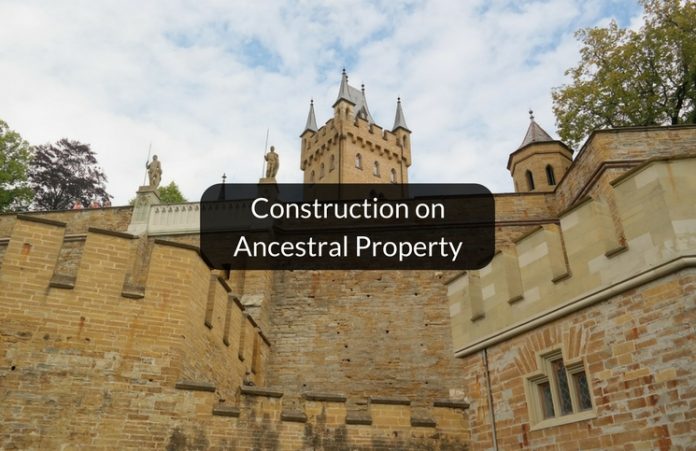In this blog post, Pravesh Naveriya from RDVV, Jabalpur, talks about the process to follow if your brother starts construction on your ancestral property without your consent.
In our country, most of the people are either not aware of the laws related to division of property or even if they are aware they wait for the right time to make a will, which unfortunately never comes. If each and every person of the country starts making a will, then at least half the burden of the civil courts will be relieved. Most of the matters in the civil courts of the country are there because the ancestors haven’t made a will and the legal heirs are fighting over their property rights.
In today’s world, the relations are being broken due to the very fact that there are disputes between them regarding the property which they are supposed share.
Succession Under Hindu Law
The succession of a Hindu family property is governed by the Hindu Succession Act, 1956 read with the Indian Succession Act, 1925. Sikhs, Jains and Buddhists are also included within the definition of Hindu.
- The entire ancestral property although belongs to each and every coparcener but no one can claim even a single portion of the property to be completely his.
- It is a property which is to be shared by each and every coparcener equally and completely.
- A coparcener is a person of the Hindu Undivided Family(HUF), who has a claim over the property of his ancestors.
- All the coparceners are members of the Hindu undivided family but all the members of the Hindu undivided family are not coparceners.
- After the 2005 amendment to the Hindu Succession Act, 1956, a female member has also been included within the definition of a coparcener.
- Earlier it was only the male members of the family who were included within the definition of a coparcener under Section 6 of the Act.
- For example if a man has 3 sons and a property of 90 acres then all the three sons can use the entire property as and when they feel like, but no one of them can claim that even a single part of the property belongs exclusively to him, till the time the final partition has taken place.
- If they want to enjoy a specific part of the ancestral property on their own exclusively, then they must get a partition done first, legally.
Succession Under Muslim Law
When a Muslim dies, the property and money which he or she possessed, first of all, is to be used for his or her funeral expenses. If after the funeral expenses are fulfilled, some property is still available and he hasn’t made any will or any declaration that how is the distribution of the property to be done, then that is to be distributed according to the Personal Law (Shariat) Application Act, 1937 read with the Indian Succession Act, 1925.
- Under Muslim law the distribution of movable as well as immovable property is to be done in the same manner, which is different from the English and the Hindu Law.
- Under Muslim law, a man and a woman are both considered to be the legal heirs of the property.
- The only difference between a man and a woman regarding succession is, of the share which they shall get.
- A man’s share is double to that of a woman, that is, if a man dies, and the property is to be distributed only among his one daughter and one son, then the son will get 2/3rd of the property and the daughter shall get only 1/3rd share of the property.
Indian Succession Act, 1925
The answer to the question that if an Indian citizen does not belong to any of the above mentioned religions then what he should do, is answered by the Indian Succession Act, 1925. It applies it to each and every citizen of the country.
- As per the Act, each heir shall get an equal share in the ancestral property.
- According to this if there are four legal heirs of a person then all four of them shall get equal portions of the property.
- Earlier only a son had a right over the property of his father but after the 2005 amendment, even a daughter shall get an equal share as that of a son.
- Now both daughter and son can claim a share in the ancestral property.
Suggested Reading: How and When to Make a Last Will and Testament
Legal Options
If the will has not been executed and the brother still, is either trying to start or has already started the construction over the disputed or the ancestral property, then one can make a representation to the court regarding the issue. The legal options upon which a person can approach the court against his or her brother is to get an order of injunction provided under order 39 rules 1,2 and 3 of the Code of Civil Procedure.
Injunction
Injunction is the order which is passed by a court to either stop or restrain the defendant from either starting or stopping to do something. In other words, an injunction is the order of a court which demands a person to either perform an act or refrain from doing something. Injunctions are broadly divided into two types, temporary and permanent.
Permanent and Temporary Injunction
- A permanent injunction is passed as the final order and after it has been passed.
- A temporary injunction is an injunction which is passed by the court to make sure no further act is done related to that property or work.
- If someone’s brother starts construction over the ancestral property then he can approach the court and file an application under order 39 rule 1 and 2 of the Code of Civil Procedure to get an order of temporary injunction.
- The court after examining the application will ask the defendants to file their reply on this case.
- The court after examining their reply may either reject the application or accept it.
- If the court has accepted the application then it shall make an order of temporary injunction, ordering the respondent to stop the construction work on that particular property.
Ex-parte Injunction
It is a general rule that no order shall be passed without hearing both the parties or in other words it is compulsory that both the parties are given appropriate opportunity of being heard before any order is passed. But there are certain exceptional cases in which a leave is given to this rule. One of the exception is an ex-parte injunction order.
- An ex-parte injunction order is an order of injunction which is passed by the court without hearing both the parties.
- If someone’s brother starts construction over the ancestral property then he may approach the court and file an application for temporary injunction under order 39 rule 1 and 2 of the Code of Civil Procedure.
- In case the defendants are not replying, or the applicant feels that by the time the reply shall come, he will bare a huge loss, and if the court is also satisfied with his contention, then the court may pass an ex-parte injunction order under order 39 rule 3 of the Code of Civil Procedure.
- It happens very rarely and the burden of proof is upon the applicant to prove that his case comes under the definition of exception provided under law.
Criminal Cases
One may explore even filing of criminal cases in certain situations. Especially where one may be able to establish criminal trespass or such other crime.
Conclusion
The question that what should be done when his brother or sister or any other co-heir starts construction on the shared property is very common in the country. This is because people in India hardly makes a will regarding what should be done with the property after their death. There are different personal laws which govern the succession of property of intestates of different religions existing in the country.
There is also a common succession law in the country the Indian Succession Act, 1925 which governs each and every citizen of the country. There is a legal option to file an application to obtain a temporary injunction order, which is available to each and every person, to deal with a co-heir who has started construction over the ancestral property.
What are your views on this? Feel free to comment below & share the article.
 Serato DJ Crack 2025Serato DJ PRO Crack
Serato DJ Crack 2025Serato DJ PRO Crack










 Allow notifications
Allow notifications



Best blog, I have ever read yet! If possible, Kindly share your contact to me
Law needs to be changed:
All the party member of the family having heir rights needs to be gather in one spot with both the lawyer with police like group discussion…Judge needs to hear everything and then reply needs to be given on the 7th day itself… Why months to months, years to years for clearing the case…